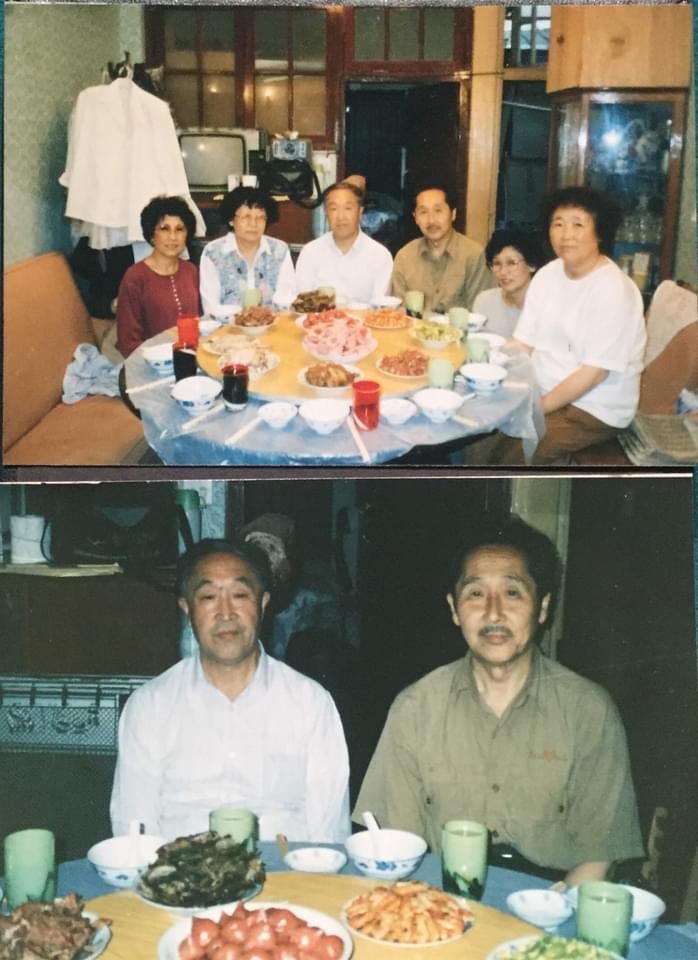The Long and Winding Road: Remembering My Two Maternal Uncles

My first uncle is to the left of my second uncle surrounded by the aunts. (Courtesy of Raymond Lee).
The passing of my two uncles has led to my reflecting on their lives, and the indelible impressions both left on me. My first (older) uncle, Cui Wen-Chiao (1925-2017), and second uncle, Cui Wen-Tse (1931-2021), led very different existences, but both experienced much of China’s upheavals from the past century.
After graduation from boarding school, my first uncle left home to seek his fortunes in the 1940s. In contrast, my second uncle kept close to the family and helped to look after the younger siblings during the Second Sino-Japanese War (1937-45) while his father and brother were away. In his late teens, however, he was separated from the family after the occupation of Nanjing and Shanghai by the PLA in 1949-50. By this time, my first uncle had married his classmate and stayed behind in Shanghai.
The career of my first uncle in the Chinese Merchant Marine spanned 50 years, where he toured the East and South China Seas, making ports of call to Japan and Hong Kong. He would captain his own vessel and serve as instructor at the Merchant Marine College of Shanghai Maritime University. Meanwhile, my second uncle studied history in college at Chengdu in Sichuan province, where he met his future wife. In the coming years, they and their families endured the travails of the Great Leap Forward (1958-62) and the ensuing famine (1959-61), during which my second uncle nearly perished from starvation. They all felt the effects of the political and economic turbulence that was the Cultural Revolution (1966-76), as their children (my first cousins) were compelled to forego college/university education.
Upon meeting my first uncle and his family in 1979, I was struck by his towering presence ( 6’ 2”) that belied a soft-spoken, dignified demeanor. He and his family enjoyed a quiet, simple life in the Latin Quarters near the Bund. Their apartment was furnished with rosewood antiquities, the only remnants of the material wealth from his wife’s family to have survived the Cultural Revolution. We met again in 1995 during the reunion among the six siblings.
Upon meeting my second uncle and his family at Xian in 1995. I was struck by his quick wit, easy banter, and sense of humour. He recalled as a youth fleeing with the family from one place to another to escape the ravages of war-torn China, and how American GIs introduced the neighbourhood kids and him to the game of baseball and gave them bubble gums and chocolates. My fondest memory was when he took me to visit the Cui family ancestral home at the industrial city of Shenyang in Northeastern China during August of 1995. He remembered vividly his grandfather working at a munitions factory near the city’s main railroad station during the 1930s. From him, I learned that the Cui ancestors were salt merchants originally from Shandong province, who migrated north to Liaoning province eight generations (200 years) ago. My other fond memory was visiting Chongqing with him in 2001, where we experienced the Sichuan customs and savoured it’s hot and peppery cuisine.
I was amazed how much my first uncle resembled my grandfather, who served as an UN advisor and university lecturer in agricultural economics. Born in 1908, he was only 17 when my grandmother, born in 1901, had first uncle. Years later, I learned that the traditional betrothal arrangement in northeastern China was where the bride would be much older than the groom. In contrast, I was impressed how much my second uncle resembled my grandmother, a Manchurian belonging to the Jin clan represented by the Plain Yellow Banner. She courageously and capably managed all domestic affairs during wartime and ran a tailor shop after they moved to Hong Kong. The one regret that she and her sons shared was not being able to reunite again after their separation.

The silk embroidery of the Shanghai Bund. (Courtesy of Raymond Lee).
Bund of the 1930s, as a memento of a long maritime career in the “Paris of the East.” Alas, I can only bid you both adieu from afar, dear uncles! May the warm, swift trade winds of the China Seas be at your backs in your voyage to the next world to reunite with my grandparents and first aunt.
Written by CHSA community member, Raymond Lee. Lee was born, raised, and educated in San Francisco Chinatown. Raymond and his wife reside in Winnipeg, Canada. He is currently employed at the Asper School of Business, University of Manitoba.
 startyger-blog liked this
startyger-blog liked this  xanderwithanx liked this
xanderwithanx liked this fruitsalad864 liked this
pulsewraith liked this
pulsewraith reblogged this from chsamuseum
chsamuseum posted this